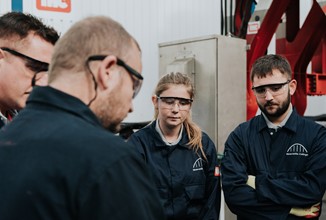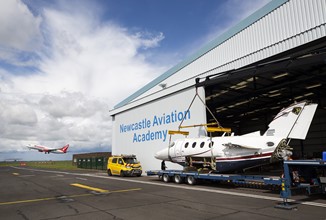
Aeronautical Engineering - Level 3
Start Date: 1st September 2026
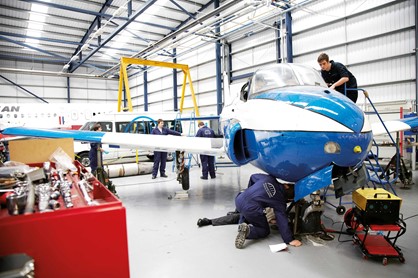
- Length 2 years
- Study Full-Time
- Location Aviation Academy, Woolsington
Qualification Gained
Level 3 Pearson BTEC National Diploma in Aeronautical Engineering
Levels ExplainedMore about the course
This is a hands-on, progression-focused course which will help you develop the skills needed to kick-start your career as an aircraft engineer.
Based at our award-winning Aviation Academy, which includes an aircraft hangar and training aircraft, you will learn how to design, build and maintain aircraft and aviation equipment.
You will learn from tutors who have worked as aircraft engineers, avionics technicians and weapons technicians for companies such as the Royal Air Force.
If you enjoy problem-solving, love to work under pressure and have an interest in engineering and aircraft, this could be the right course for you.
Get In Touch
Meet our staff and students
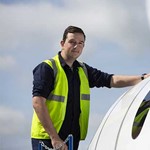
Max Elcoat
BSc in Aircraft Maintenance Engineering"Being at the airport, around the planes, and working in the hangar, you’re always focused on the end goal. But, for me, hands down, one of the best things about studying here is hearing from ex-students about where they are now. It’s so motivating see what you could be doing in a few years’ time, and it proves how good of a place it is. For instance, I had no idea that the current Maintenance Manager for Boeing UK studied here just ten years ago, until he came to give us a talk about his experience and career-to-date."
Aviation at Newcastle College
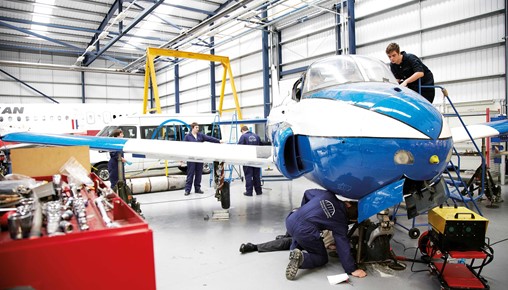
What can I do with a qualification in Aviation?
Daily tasks:
- Organises and establishes control systems to monitor operational efficiency and performance of materials and systems.
- Ensures that equipment, operation and maintenance comply with design specifications and safety standards.
- Designs mechanical equipment, such as steam, internal combustion and other non-electrical motors for railway locomotives, road vehicles, aeroplanes and other machinery.
- Determines materials, equipment, piping, capacities, layout of plant or system and specification for manufacture.
- Undertakes research and advises on energy use, materials handling, thermodynamic processes, fluid mechanics, vehicles and environmental controls.
Powered by EMSI
Daily tasks:
- Prepares specifications for materials and other components.
- Produces final design information for use in preparation of layouts, parts lists, etc..
- Arranges construction and testing of model or prototype and modifies design if necessary.
- Prepares working designs for steam, aero, turbine, marine and electrical engines, mechanical instruments, aircraft and missile structures, vehicle and ship structures, plant and machinery equipment, domestic electrical appliances, building systems and services, and electronic computing and telecommunications equipment.
- Assesses product requirements, including costs, manufacturing feasibility and market requirements.
Powered by EMSI
Daily tasks:
- Provides technical consultancy services.
- Examines and advises on patent applications.
- Prepare sketches, drawings and specifications showing materials to be used, construction and finishing methods and other details.
- Devises and implements control systems to monitor operational efficiency and performance of system and materials.
- Designs new systems and equipment with regard to cost, market requirements and feasibility of manufacture.
- Establishes principles and techniques to improve the quality, durability and performance of materials such as textiles, glass, rubber, plastics, ceramics, metals and alloys.
- Researches into problem areas to advance basic knowledge, evaluate new theories and techniques and to solve specific problems.
Powered by EMSI
Daily tasks:
- Accompanies pupil on training flights and demonstrates flying techniques.
- Performs specified tests to determine aircraft.
- Maintains radio contact and discusses weather conditions with air traffic controllers.
- Monitors fuel consumption, air pressure, engine performance and other indicators during flight and advises pilot of any factors that affect the navigation or performance of the aircraft.
- Directs or undertakes the operation of controls to fly aeroplanes and helicopters, complying with air traffic control and aircraft operating procedures.
- Directs or undertakes routine checks on engines, instruments, control panels, cargo distribution and fuel supplies.
- Studies flight plan, discusses it with flight deck crew and makes any necessary adjustments.
Powered by EMSI
Daily tasks:
- Monitors the standards of scientific and technical research undertaken by the research team.
- Plans work schedules, assigns tasks and delegates responsibilities to the research and development team.
- Develops research methodology, implements and reports upon research investigations undertaken.
- Liaises with production departments to investigate and resolve manufacturing problems.
- Establishes product design and performance objectives in consultation with other business functions.
Powered by EMSI
What can I do with a qualification in Aviation?
Mechanical engineers
Daily tasks:
- Organises and establishes control systems to monitor operational efficiency and performance of materials and systems.
- Ensures that equipment, operation and maintenance comply with design specifications and safety standards.
- Designs mechanical equipment, such as steam, internal combustion and other non-electrical motors for railway locomotives, road vehicles, aeroplanes and other machinery.
- Determines materials, equipment, piping, capacities, layout of plant or system and specification for manufacture.
- Undertakes research and advises on energy use, materials handling, thermodynamic processes, fluid mechanics, vehicles and environmental controls.
Powered by EMSI
Design and development engineers
Daily tasks:
- Prepares specifications for materials and other components.
- Produces final design information for use in preparation of layouts, parts lists, etc..
- Arranges construction and testing of model or prototype and modifies design if necessary.
- Prepares working designs for steam, aero, turbine, marine and electrical engines, mechanical instruments, aircraft and missile structures, vehicle and ship structures, plant and machinery equipment, domestic electrical appliances, building systems and services, and electronic computing and telecommunications equipment.
- Assesses product requirements, including costs, manufacturing feasibility and market requirements.
Powered by EMSI
Engineering professionals n.e.c.
Daily tasks:
- Provides technical consultancy services.
- Examines and advises on patent applications.
- Prepare sketches, drawings and specifications showing materials to be used, construction and finishing methods and other details.
- Devises and implements control systems to monitor operational efficiency and performance of system and materials.
- Designs new systems and equipment with regard to cost, market requirements and feasibility of manufacture.
- Establishes principles and techniques to improve the quality, durability and performance of materials such as textiles, glass, rubber, plastics, ceramics, metals and alloys.
- Researches into problem areas to advance basic knowledge, evaluate new theories and techniques and to solve specific problems.
Powered by EMSI
Aircraft pilots and flight engineers
Daily tasks:
- Accompanies pupil on training flights and demonstrates flying techniques.
- Performs specified tests to determine aircraft.
- Maintains radio contact and discusses weather conditions with air traffic controllers.
- Monitors fuel consumption, air pressure, engine performance and other indicators during flight and advises pilot of any factors that affect the navigation or performance of the aircraft.
- Directs or undertakes the operation of controls to fly aeroplanes and helicopters, complying with air traffic control and aircraft operating procedures.
- Directs or undertakes routine checks on engines, instruments, control panels, cargo distribution and fuel supplies.
- Studies flight plan, discusses it with flight deck crew and makes any necessary adjustments.
Powered by EMSI
Research and Development Managers
Daily tasks:
- Monitors the standards of scientific and technical research undertaken by the research team.
- Plans work schedules, assigns tasks and delegates responsibilities to the research and development team.
- Develops research methodology, implements and reports upon research investigations undertaken.
- Liaises with production departments to investigate and resolve manufacturing problems.
- Establishes product design and performance objectives in consultation with other business functions.
Powered by EMSI
Good to know
What's happening

October Open Event
Rye Hill Campus
Wednesday 1st October 2025
5:00pm - 7:00pm

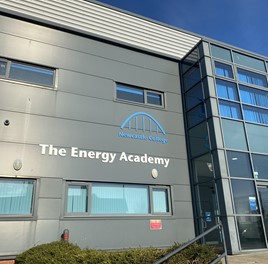
Energy Academy November Open Event
Energy Academy, Wallsend
Wednesday 19th November 2025
5:00pm - 7:00pm
Either
- The level required to start the course
- The level rewarded when completing the course
Not a Newcastle College student?
If you are not currently a Newcastle College student, apply here:
VISIT UCASNewcastle College students
If you are a current Newcastle College student, apply here:
CURRENT STUDENT APPLICATIONor Continue Browsing
Course Added
This course has now been added to your basket. Please click below to apply now or continue browsing.
Apply Now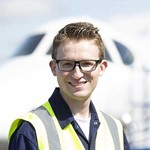
 Levels Explained
Levels Explained
 College or Sixth Form. What's the difference?
College or Sixth Form. What's the difference?
 16-18 Financial Support
16-18 Financial Support
 How to Apply
How to Apply
